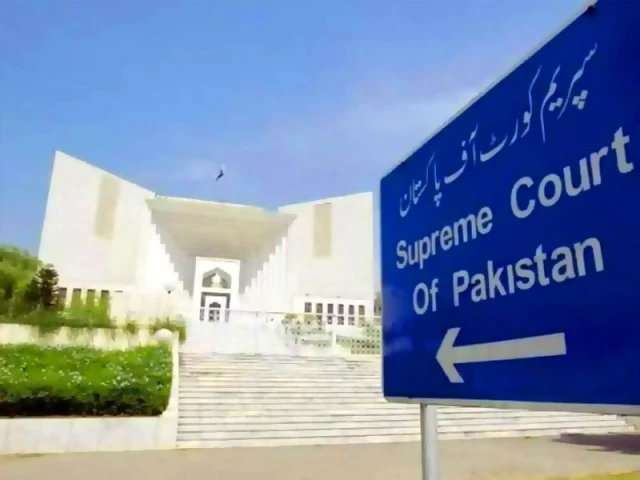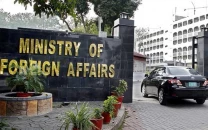Civilians' military trials not unconstitutional: SC
CB issues detailed verdict on military courts, Rules Constitution does not bar special forums, Grants independent

The Supreme Court has held that the trial of civilians under the Army Act does not violate fair trial standards, as the Constitutional Bench on Monday issued its detailed judgmentmore than four months after setting aside an earlier apex court ruling that had declared such trials unconstitutional.
By a 5-2 majority, the bench reaffirmed its short order of May 7. Two judgesJustice Jamal Khan Mandokhail and Justice Naeem Akhtar Afghandissented, holding that the military trials of civilians were unconstitutional.
"The conduct of trials under the Army Act, where exercised within statutory limits and supported by procedural safeguards, does not violate fair trial standards. The impugned judgment erred in holding otherwise," wrote Justice Aminuddin Khan in the 68-page verdict.
The judgment examined whether civilians' trials under the Army Act met the requirements of fairness, impartiality, and due process guaranteed under Article 10A of the Constitution, and whether military tribunals constituted a constitutionally adequate forum for adjudicating such cases.
The judgement said that the Army Act, as a legislative framework, provided for an internal procedural structure that included detailed rules of evidence, rights of the accused to be informed of charges, the right to counsel, cross-examination of witnesses, and appellate review through section 133-B.
"These safeguards are embedded in the military justice system, as was affirmed by this court in Shahida Zahir Abbasi in 1996," it said, noting that in international law, including Article 14 of the International Covenant on Civil and Political Rights (ICCPR), military tribunals were not per se unconstitutional.
"What is required is that such tribunals afford basic guarantees of fairness, including an independent appellate process. The Army Act, through its internal review structure, satisfies these minimum standards," the court said.
"Fair trial does not mandate that every forum must be identical in structure to regular courts. What it demands is that the forum be fair, impartial, and governed by transparent rules. The Army Act, as currently framed and applied in the present context, meets this constitutional requirement."
About the question whether the adjudication by military courts in relation to civilians infringed the constitutional principle of separation of powers as established in Article 175(3) of the Constitution, and whether such adjudication amounts to an unconstitutional usurpation of judicial authority, the judgment noted that the Constitution did not prohibit the establishment of specialised forums outside the scope of Article 175, provided they did not supplant the ordinary courts or violate constitutional guarantees of fairness.
The court also held that a proper understanding of Article 175(3) required recognising the functional role of military justice. "Military Courts address offences that bear a direct relationship to national defence and military operations," it said.
"They do not exist to replace civilian courts, but to operate within a narrowly defined legal space to serve purposes that civilian judicial forums are not equipped to address. Their jurisdiction, therefore, must be understood in the context of operational exigencies, rather than in abstraction from them."
The judgment said that military justice in Pakistan had developed as a structured legal system with defined jurisdiction, procedural safeguards, and limited scope. "It is not a discretionary or ad hoc mechanism but a codified and historically entrenched system. Where its jurisdiction over civilians is exercised with fidelity to statutory purpose and military necessity, it does not violate Article 175(3)."
Although Article 10A of the Constitution did not apply directly to the Pakistan Army Act due to the exclusion provided by Article 8(3)(a), the judgment noted, the minimum standards of fairness and procedural justice were nonetheless embedded within Article 4 of the Constitution, which affirmed that "every individual shall be dealt with in accordance with law".
These standards also find reinforcement in Pakistan's international obligations under Article 14 of the ICCPR, which mandated that persons charged with criminal offences must have the right to a fair hearing by a competent, independent, and impartial tribunal established by law.
The judgment held that appropriate constitutional response was not to strike down the existing provisions outright but to acknowledge that, while the Army Act provided basic procedural due process in form, it lacked the structural guarantees necessary for a fair appellate forum in the case of civilians.
"Therefore, the legislative framework must be supplemented to provide for an independent right of appeal to the High Courts for civilians convicted under the said provisions," the court ruled.
The court also held that while the procedural framework under the Army Act includes formal due process protections, the absence of an independent right of appeal to a civilian court rendered its application to civilians constitutionally incomplete.
"The provisions are not inherently unconstitutional, but this deficiency requires legislative intervention. This Court therefore refers the matter to Parliament for the enactment of appropriate amendments, with the expectation that such institutional deference will be accorded due respect," it said.
"The Government and Parliament are urged to undertake the necessary amendments or enact suitable legislation in the Pakistan Army Act, 1952, and allied rules within a period of 45 days to provide an independent right of appeal in the High Courts against convictions rendered by Court Martial or Military Courts in respect of offences under sub-clauses (i) and (ii) of clause (d) of subsection (1) of section 2, read with subsection (4) of section 59 of the Pakistan Army Act, 1952."
The court also held that the judicial function was to interpret, not to legislate. The court reiterated the principle that constitutional adjudication must be confined within the contours of the text.
The Constitutional Bench held that the Supreme Court's earlier bench erred in disregarding the doctrines of constitutional avoidance and interpretive restraint, adding that striking down the provisions in their entirety lacked proportionality and doctrinal support.
"The impugned judgment is therefore liable to be set aside to exceed the minimum corrective required under the Constitution," the judgement said. It noted that although the petitions did involve questions of public importance and the violation of fundamental rights, the original bench failed to satisfy the twin requirements for invoking this court's extraordinary original jurisdiction: the existence of a question of public importance and the alleged violation of a fundamental right.
"This jurisdiction is not to be invoked casually; rather, it is a tool of last resort for matters of profound constitutional significance, said the detailed judgment. "The impugned judgment is fatally flawed for its failure to explicitly and convincingly address this preliminary jurisdictional objection."
Continuing, the judgment said that the SC bench's decision to proceed without a clear, reasoned finding on maintainability was not a mere analytical omission but a grave dereliction of judicial duty.
"Article 184(3) is a powerful constitutional provision, and its application cannot be presumed or taken for granted. This Court finds that the impugned judgment's silent assumption of jurisdiction was a dangerous precedent that must be corrected."



1675249047-0/image-(18)1675249047-0-208x130.webp)


















COMMENTS (1)
Comments are moderated and generally will be posted if they are on-topic and not abusive.
For more information, please see our Comments FAQ